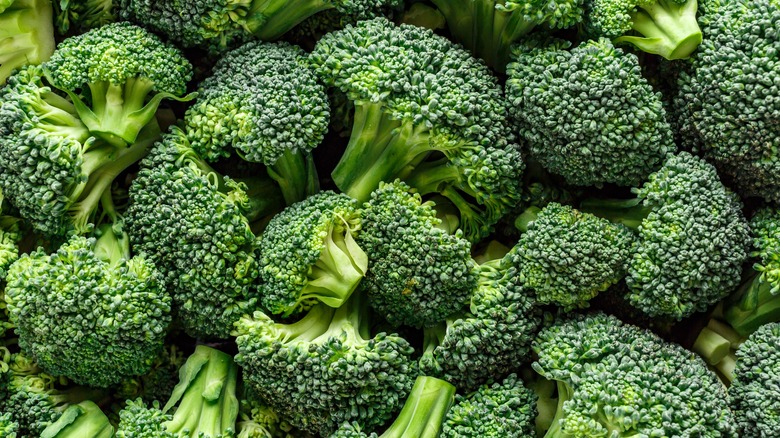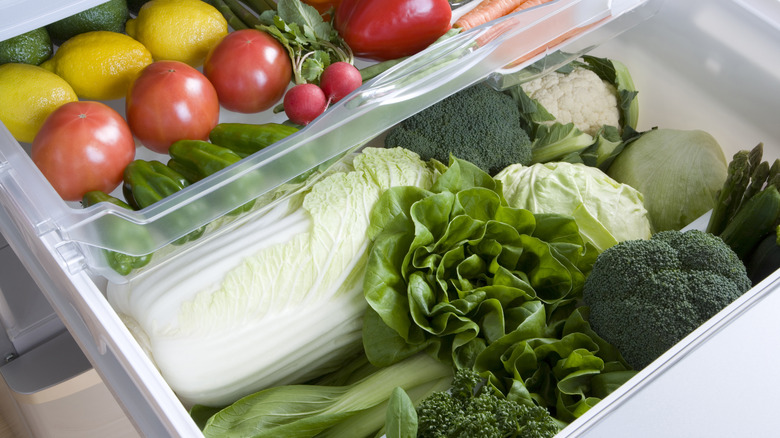The Right Way To Store Broccoli So It Stays Fresh For Longer
There's nothing worse than buying some lovely, fresh broccoli, only to discover that it's gone limp and sad by the time you're ready to braise it or toss it on a sheet pan and roast it. It's pretty discouraging to do something responsible (buying green veggies! cooking at home!) and face punishment from the grocery gods anyway. All you can do is take measures to preserve the fridge life of your vegetables, and luckily, broccoli is easy to store the right way.
Broccoli can be delicious with cheese or just roasted and enjoyed on its own, but like its cruciferous cousins — such as cabbage and Brussels sprouts — it can smell bad and taste even worse when it gets past its prime. Proper storage is the key to keeping your florets crisp and fresh. Broccoli is best stored in the crisper drawer of your refrigerator, which you might already know, but the material you store it in is just as important as its place in the fridge.
Broccoli retains its crisp and snappy texture for longer if it's wrapped in plastic, but not too tightly. The veggie needs some breathing room, so perforated plastic bags with holes or other openings are ideal. Broccoli is sometimes sold in perforated bags, making storage easy-peasy, but if you buy it in an airtight package, you should loosely wrap it in a plastic bag. Either don't seal the bag or poke some holes in it to give the broccoli some air.
Why broccoli needs a bit of air
It might be your first instinct to seal your fruits and veggies in near-airtight containers, like sealable plastic bags, to keep them fresh. In reality, you're just trapping a gas called ethylene in with your produce, and causing it to wilt faster. Many types of produce, including broccoli, emit ethylene while in storage. This gas is able to ripen (and rot) produce even after it's picked and eventually makes it way into your fridge.
For broccoli to stay fresh for as long as possible, its ethylene gas needs a way to escape. However, you don't want to leave broccoli completely exposed, either. Too much contact with dry refrigerator air will cause the crunchy stalk to lose its firm snap more quickly, making for a pretty unpleasant bite. That's why it's ideal to store broccoli in a plastic wrapping that's either loose or perforated.
The crisper drawer also keeps broccoli and other veggies from drying out. These drawers are also called humidity drawers because — big surprise — they maintain a more humid environment than the rest of the fridge. That said, too much humidity will also cause produce to rot more quickly, as letting food sit in excess moisture encourages mold growth. This is why many produce guides instruct you not to wash veggies until right before you use them. If your broccoli from the farmer's market has dirt on it and you want to wash it ASAP, thoroughly dry it before storing.
How to store broccoli that's already been cut
If your broccoli is already chopped up — because you bought it that way, you're meal prepping, or you just cut more than you needed — storing it in a hole-filled plastic bag will create a mess of tiny green florets all over the bottom of your fridge. Instead, store pre-cut florets in a glass container or even a big mason jar, and line it with a paper towel first. The towel will absorb any excess moisture, so that the broccoli isn't trapped in humid, mold-causing conditions. Just be sure to use up chopped broccoli within two or three days, or its flavor can decline.
If you need to preserve broccoli for longer, your best bet is to blanch and freeze the cut florets. Simply boil them for a few minutes, dunk them in ice water to stop the cooking process, then stick them in the freezer in an airtight container or sealable freezer bag. Frozen broccoli can stay in the freezer for up to a year, so you can pretty much take all the time you need to use it up.
Your instincts should tell you pretty clearly when broccoli is past its prime, but keep an eye out for mold or soft, mushy, and discolored spots. Yellowish spots and a rubbery texture are also signs of broccoli that's on its way to going bad, and of course, rotting broccoli emits an unpleasant odor. When in doubt, throw it out.


